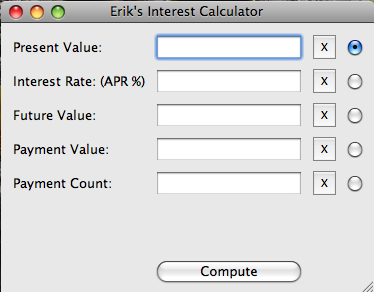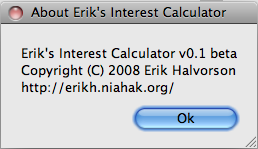So I've finally decided to release a preliminary version of my interest calculator. I'm going to first release the source code and then look into releasing a compiled binary specifically for OS X. This version is released under terms of the GNU GPL, as it was developed using Qt 4.4.3 (open source edition). Future programs that I develop (and, if I determine it permissible, future releases of this program) may be released under the terms of the Creative Commons licenses.
The source code is available here. Some form of Qt 4.x will be required; I've tested versions 4.4.3 and 4.3.5, but earlier (or more recent) releases may work as well. Obligatory disclaimer:
This program is free software: you can redistribute it and/or modify it under the terms of the GNU General Public License as published by the Free Software Foundation, either version 3 of the License, or (at your option) any later version.
This program is distributed in the hope that it will be useful, but WITHOUT ANY WARRANTY; without even the implied warranty of MERCHANTABILITY or FITNESS FOR A PARTICULAR PURPOSE. See the GNU General Public License for more details.
You should have received a copy of the GNU General Public License along with this program. If not, see http://www.gnu.org/licenses/.
Showing posts with label programming. Show all posts
Showing posts with label programming. Show all posts
07 February 2009
08 November 2008
Interest application improvements
So I've decided to clean up my interest application a bit more... A few improvements that I added are as follows:
- Algorithmic Improvements
Everything is still binary search, but the program is now capable of searching a much wider array of possibilities. - Radio Buttons

The radio buttons on the right side of the screen allow the user to control which item is being searched for. For example, if the user has 'Number' selected, then hits compute, then the Number is searched for even if it is not blank. This allows you to search different cases much more quickly. GnuCash (the inspiration for the original program) did not have this feature, but I think it works much better. - About Screen

Pretty simple, but important nonetheless.
22 September 2008
Interest for the Masses

My recent encounter with the seedy underside of consumer financing has led me to conclude that I should have a better understanding of compound interest. Of course, everyone learns the basics in school -- i.e., that if your APR is x percent, and your principal is k, and the interest is compounded, say, monthly, then your principal will accumulate (x / 1200) * k in interest over one month. Roll this out into compounding, and after z months, you end up with (1 + x / 1200) ^ z * k.
Things get a little murkier if you make payments, however. Ever wonder where your credit card's minimum payment comes from? How about your auto loan payment? Most financial companies have a simple financial calculator where they input the relevant parameters of the loan, e.g. interest rate, principal balance, number of payments, and (often implicitly) the future value, then compute the minimum payment required to achieve the value. This is some pretty basic math, based largely on Geometric Series, but it's often helpful to have a specialized calculator to experiment with different payment schemes.
Tons of financial calculators exist on the web. Hell, I'm sure there are even some free ones. However, the one I'm most familiar with (a component of the GnuCash financial package) gives incorrect results; when I put our auto-loan into the program, it concluded that I would pay an entire extra payment's worth of interest -- a difference of over $250. One very bored and cramped train ride later, I cooked up the basics of a financial calculator, following the GnuCash calculator model. I didn't even try to simplify the math, rather using binary search and enumeration to compute everything. I was able to use it to figure out roughly how much interest we will be paying off for various monthly repayment schemes for our car, which is pretty cool. Give me some time and I'll throw together a web page for the thing, and maybe write some more about it.
Fun Fact: I found that if you have two million dollars and you can invest it at a 7% APR (compounded monthly) -- which is probably possible, at this scale -- you can receive a fat paycheck of $11k per month. Which leaves me wondering how lotto winners ever go broke.
Subscribe to:
Posts (Atom)